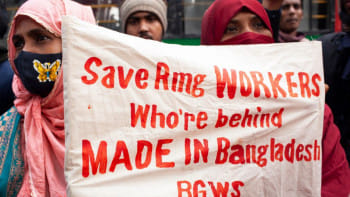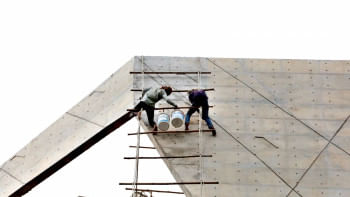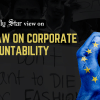How some actors gambled with workers’ rights to save corporate profits

On the morning of April 24, 2013, the Rana Plaza building in Dhaka, Bangladesh collapsed, killing more than 1,100 people, most of whom were garment workers, and injuring more than 2,500 in what is considered one of the deadliest industrial accidents on record. Workers in the building produced clothes for well-known brands such as Benetton, Mango, and Walmart. Exactly 11 years later, the European Parliament green-lit a much-awaited piece of legislation that was, at least in part, inspired by the tragic events in Bangladesh: the Corporate Sustainability Due Diligence Directive (CSDDD).
A first of its kind, the law will impose on large companies based and operating in the European Union an obligation to prevent, terminate or mitigate, and redress harms to human rights and the environment in their global value chains. The CSDDD offers hope to victims of corporate abuse worldwide, yet many important parts of the law were lost during gruesome legislative negotiations and unprecedented pressure from business lobbies.
For too long, private capital has been engaged in a cutthroat price race to the bottom. This is evident in the garment and footwear sectors, where EU-based brands have delocalised and externalised production, virtually reproducing the early 19th century sweatshop system in Central and Southeast Asia, and in other places away from the eyes of EU consumers. Far from a feature unique to the fashion industry, the externalisation of production and the socialisation of its cost through hyper-low wages and predatory exploitation of natural resources have been the new normal for a while now. It is how our electronic devices are made, how exotic fruits are grown, packaged, and imported, and how mega-infrastructures are built. What keeps the system going is a combination of increasing profit margins for companies and impunity. When workers try to sue EU-based brands for poverty wages or when communities whose natural ecosystems are destroyed by oil companies or extractive projects, accountability gets lost in the intricate chains of intermediaries and subcontractors.
Companies promised they would address the issue more than 10 years ago when endorsing voluntary commitments contained in the OECD Guidelines for Multinational Enterprises and the United Nations' Guiding Principles on Business and Human Rights. Yet, labour activists, Indigenous Peoples and civil society at large have continued declaring one irrefutable fact: voluntary commitments have not worked.
The CSDDD is the result of years of campaigning by a large coalition of civil society groups including trade unions, faith groups, NGOs, consumer associations, and human rights professionals who successfully managed to shift the narrative around corporate abuse: from one centred around a company's willingness to adopt voluntary principles, to one focused on binding, enforceable rules for corporations. Public pressure pushed European Commissioner for Justice Didier Reynders to present a draft directive to fulfil two crucial objectives: prevent corporate harm, and provide access to remedy and justice for victims. Reynders' proposal saw the light of day in February 2022, a birth that was already marred by two possible abortions at the hand of the commission's own Regulatory Scrutiny Board: an opaque internal bureaucracy that has the stated mission of ensuring new EU laws are business-friendly—regardless of whether said text is meant to regulate standard screw sizes, environmental protection, human rights, or bridge safety.
The European Commission proposal went through an extensive and unusually participatory legislative process. Before it was published, about half a million EU citizens participated in the relative public consultation. Over two years, roundtables, workshops and public conferences were organised by parties along the political spectrum. Lawmakers heard from NGOs, trade unions, representatives of Indigenous Peoples from across the globe, legal experts, large businesses, small businesses, bankers. A tight-knit group of negotiators in the European Parliament, led by Dutch Socialist MEP Lara Wolters, found workable compromises to respond to worries about red tape while keeping the core of the law intact: an obligation to prevent and remedy in line with international standards, strong enforcement mechanisms, and the participation of stakeholders and communities throughout the due diligence process. As far as EU legislative processes go, it was an unusually public and transparent affair.
For too long, private capital has been engaged in a cutthroat price race to the bottom. This is evident in the garment and footwear sectors, where EU-based brands have delocalised and externalised production, virtually reproducing the early 19th century sweatshop system in Central and Southeast Asia, and in other places away from the eyes of EU consumers. Far from a feature unique to the fashion industry, the externalisation of production and the socialisation of its cost through hyper-low wages and predatory exploitation of natural resources have been the new normal for a while now. It is how our electronic devices are made, how exotic fruits are grown, packaged, and imported, and how mega-infrastructures are built.
While the parliament was agreeing on its own text, the Council of the EU (where unelected government representatives from member states sit) had also worked on its version of the law, and in July 2023, the two institutions engaged in what is informally known as "trilogue," a legislative practice through which the co-legislators engage in negotiations until they can agree on a common text. After an extenuating round of technical and political meetings, the parliament and the council announced they had reached an agreement in December 2023.
The political agreement improved on many of the commission's initial proposals: it applied to companies with more than 500 employees and 150 million euros in net global turnover; and it included a range of enforcement mechanisms, allowing interested parties to file claims both at the member states' administrative authorities and in European courts. It asked companies to perform mandatory human rights and environmental due diligence in line with previously voluntary international standards. Yet, in a do-ut-des, member states like France managed to exclude the financial sector from the main obligations of the law and to reduce the obligations for companies to implement climate transition plans in line with the Paris Agreement to a mere formality with no teeth. However, the "Agreement," as it soon came to be known in policy circles, would be short-lived.
In an unpredictable turn of events, the junior partner of the German governing coalition, FDP, a party polling slightly below three percent, decided to oppose the December Agreement, agitating red tape and bureaucracy as a prop against the law. The German turnaround soon found support in the Italian government. The announced abstention of two of the largest member states caused many others to change their positions, leaving the Belgian presidency suddenly responsible for trying to save a done deal that suddenly seemed as good as dead. The vice-president of the European Parliament, Heidi Hautala, denounced a German-Italian "horse-trading": Italy would help Germany kill the due diligence law if Germany helped Italy kill a directive on packaging and packaging waste that was then under negotiation. As a livid Lara Wolters told the European Parliament, referring to Giorgia Meloni, German Finance Minister Christian Lindner, and Emmanuel Macron, "We had a deal, but business lobbies would not give up… These leaders are now convinced accountability is a burden and human rights are nice-to-have." For a few weeks, it looked like EU institutions would not agree on the law before the end of the current parliamentary mandate, which could have meant the virtual death of the legislative process.
Wolters' words were echoed by calls from an unprecedented number of public and less public figures, a rarity in EU-lawmaking: workers from all around the globe, the Elders, several representatives of UN institutions, global and national trade unions, and progressive companies, many of which had already started setting up the tools and mechanisms they would need to comply.
What survived the council vote on March 24 was a watered-down version of the original directive, applying only to companies with upwards of a thousand employees and with a global net turnover of at least 450 million euros. This means the law will apply to only a small minority of the largest companies operating in the EU. However, the core duty of the law and its enforcement mechanisms remained intact, but will not apply to core parts of the post-consumer value chain: companies will not have to check for labour and human rights abuses and environmental damage in crucial sectors such as recycling, composting, and landfilling. Moreover, the financial sector remains out of the scope of the law, and so do many rights violations, including those related to workers' occupational safety and health, the issues at the core of the deadly Rana Plaza events.
However, the CSDDD remains a milestone in the growing international framework to regulate corporate behaviour. It will create accountability mechanisms for irresponsible companies, and its obligations may trickle down to smaller companies included in their value chains. For the fashion industry, it may mean that trade unions will finally have a seat at the table and a more powerful voice to negotiate better salaries and better working conditions. It may offer sanctions and consequences for a fast fashion model that is harming both workers and the natural environment. Although the law offers workers and victims different avenues to seek justice, it remains to be seen how accessible the remedy-granting provisions will be.
Importantly, the fact that CSDDD comes out of the largest common market on the globe means that other countries will likely follow suit and adopt similar rules globally. It may also provide further impulse to ongoing negotiations at the UN for a binding treaty on transnational corporations. EU member states have now two years to transpose the law domestically, during which they can decide to improve on the standards set in the directive—for example, by increasing the number of companies it applies to, the number of rights it covers, and to ensure that victims can actually access remedy and justice through the law.
While the approval of the CSDDD may mark the beginning of a new era for responsible business conduct, moving us away from voluntary and vague corporate social responsibility commitments and towards real accountability for corporate wrongdoing, it also shows the immense imbalance of power between a few powerful corporate actors and lawmakers and civil society trying to curb their power. As it is often the case with laws, implementation will be a battle as much as its approval. It is crucial that workers, consumers, and civil society stay vigilant and work together to safeguard and improve the content of the law.
Giuseppe Cioffo is lobby and advocacy coordinator at Clean Clothes Campaign's international office.
Views expressed in the article are the author's own.
Follow The Daily Star Opinion on Facebook for the latest opinions, commentaries and analyses by experts and professionals. To contribute your article or letter to The Daily Star Opinion, see our guidelines for submission.

 For all latest news, follow The Daily Star's Google News channel.
For all latest news, follow The Daily Star's Google News channel. 













Comments